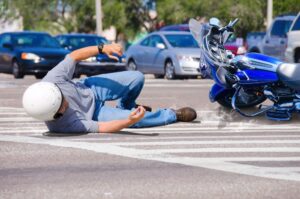If you recently suffered injuries in a motorcycle accident, don’t be so quick to blame yourself or let the insurance company or other parties blame you. The best step to take right now is to hire a seasoned motorcycle accident attorney in Redding.
Insurance companies invest heavily in advertising campaigns, aiming to convey a sense of concern for the well-being and happiness of the public. However, the reality is that these companies aim to maximize profits, and unfortunately, offering fair settlements to victims does not align with this objective.
Insurance providers exhibit a bias against those who file claims, whether they are their own policyholders or individuals harmed by their policyholders. Among claimants, motorcyclists particularly endure discriminatory treatment from insurance companies. While nearly all injured victims face challenges securing fair settlements, riders often experience the most challenging circumstances.
Any motorcyclist who has pursued a compensation claim can attest that insurance companies frequently fall short of treating them fairly. As such, you need the services of a motorcycle accident lawyer to ensure the fair handling of your claim.
Table Of Content
Insurance Companies Embrace Stereotypes
 The actions of a few individuals can shape perceptions of the entire group, and this unfortunate reality holds particularly true for motorcyclists in the eyes of insurance companies. Despite the majority of riders being safe, attentive, and respectful, the behavior of a minority tarnishes the reputation of all.
The actions of a few individuals can shape perceptions of the entire group, and this unfortunate reality holds particularly true for motorcyclists in the eyes of insurance companies. Despite the majority of riders being safe, attentive, and respectful, the behavior of a minority tarnishes the reputation of all.
The few motorcyclists who engage in speeding, weaving through traffic, tailgating, or gang activities contribute to a negative image for the entire community of riders. Consequently, even responsible riders such as yourself who adhere to safety guidelines may find themselves unfairly associated with their less responsible counterparts.
When responsible riders are victims of crashes that were not their fault and seek compensation, insurance adjusters often harbor preconceived notions that cast them as the at-fault parties.
The Need for Increased Compensation Among Motorcyclists
Insurance companies exhibit bias against motorcyclists for another reason—the often substantial compensation required after crashes. Unlike automobiles, motorcycles lack inherent safety features to shield riders.
Instead, it falls upon motorcyclists to protect themselves through safety gear like helmets, jackets, pants, gloves, and boots. Despite these precautions, even the most well-equipped riders are highly susceptible to severe injuries in accidents.
Insurance companies, prioritizing their profits, aim to minimize payouts to claimants. When injured motorcyclists file claims, they anticipate facing significant settlement amounts. Consequently, insurers often approach motorcyclists with skepticism and poor treatment from the beginning of the process.
Even Law Enforcement Often Unjustly Attributes Fault to Motorcyclists
Preconceived notions and biases against motorcyclists go beyond insurance companies and adjusters; they extend to various parties, including police officers, fellow drivers, and even witnesses, often unbeknownst to them.
Consider a scenario where a police officer responding to a crash involving a passenger vehicle and a motorcycle may instinctively assume the motorcyclist bears fault. The passenger vehicle driver might share this assumption, and witnesses might inaccurately report that the motorcyclist rode recklessly.
Without comprehensive evidence collection or further investigation, the police officer may hastily assign full or partial blame to the motorcyclists, unfortunately creating hurdles for them in obtaining compensation.
Insurers Exploit Age and Experience Biases Against Riders
Riding a motorcycle safely demands significant skill, typically acquired through safety courses and years of experience covering thousands of miles. When younger, less experienced riders are involved in accidents, insurance companies often unjustly designate them as the at-fault parties, even when contrary evidence exists.
Conversely, insurance companies also exhibit bias against older, seasoned riders. While safe motorcycle operation relies on quick reflexes and excellent fine motor skills, riders often develop these traits through years of experience. However, insurance adjusters might perceive older riders as potential hazards, irrespective of their extensive years and miles of accident-free riding.
Protect Your Claim: What Not to Do After a Motorcycle Accident
All motorcycle accident victims should be cautious about what they say and who they talk to post-accident. While they mean well and may think others mean well, that’s unfortunately not always the case.
Don’t Apologize or Talk About the Accident
If you talk to other parties involved in the accident or witnesses, don’t apologize or even discuss the accident. Of course, it’s human nature to want to say you are sorry when something bad happens, even if it’s not your fault. However, apologizing after the accident can insinuate that you are to blame. You can also make other seemingly innocent statements that can later incriminate you.
Don’t Speak with the Other Party’s Insurance Adjuster
It’s common for the other party’s insurance adjuster to call you. They might seem friendly and concerned about your well-being, but it’s usually just for show. They want to gain your confidence so that you relax and feel at ease telling them anything—or even slip up and say something they can use against you to devalue or deny your claim.
Instead of speaking with them, hiring a motorcycle accident attorney who can speak with them on your behalf is best. Not only does this take away the opportunity to say something that might accidentally hurt your claim, but it also gives you the space you need to heal.
What if the Insurance Company Says You are to Blame?
 Don’t be surprised if the insurance company tries to point the finger at you, putting as much fault on you as possible. Without the representation of an experienced motorcycle accident attorney, they will likely be successful.
Don’t be surprised if the insurance company tries to point the finger at you, putting as much fault on you as possible. Without the representation of an experienced motorcycle accident attorney, they will likely be successful.
Once you hire an attorney, they can refute this blame by:
- Hiring an accident reconstructionist
- Interviewing witnesses
- Obtaining video surveillance footage
- Reviewing police reports
Once you hire a lawyer, they will be the one to handle any blame the insurance company says you might have.
Determining Fault and the Elements of Negligence
Negligence is a fundamental concept in personal injury law that determines liability in motorcycle accidents. It refers to a failure to exercise reasonable care, resulting in harm or injury to another person. Understanding the elements of negligence is crucial when navigating personal injury cases like those arising from motor vehicle accidents.
Duty of Care
A duty of care is the first element of negligence. A duty of care refers to the at-fault party’s legal obligation to act reasonably to prevent harm to others. For instance, all motorists must drive responsibly and obey traffic laws.
Breach of Duty
Breach of duty means a failure to meet the standard of care expected in a given situation. Specifically, your lawyer will compare the at-fault party’s actions or omissions to what a reasonable person should have done under similar circumstances. For example, if a reasonable person should have stopped at a stop light, but a party to the accident failed to do so, they breached a duty of care.
Causation
The at-fault party’s breach of duty must have caused the victim’s injuries or damages to prove negligence. There must be a clear link between the breach of duty and the victim’s harm.
Damages
In negligence cases, the plaintiff (person bringing the claim) must have sustained actual harm or damages due to the at-fault party’s breach of duty. Damages can include physical injuries, emotional distress, property damage, medical expenses, lost income, and more. Without measurable damages, a negligence claim may not be viable.
Causes of Motorcycle Accidents
Motorcycle accidents can result from various causes, often involving a combination of elements.
Some common causes of motorcycle accidents include:
- Distracted Driving: Drivers can be distracted by various factors such as texting, talking on the phone, adjusting the radio, or other distractions, leading to losing focus on the road.
- Speeding: Speeding is a large contributor to motorcycle crashes. The faster a driver goes, the more it reduces their reaction time and increases the severity of injuries in the event of a crash.
- Failure to Obey Traffic Signals: Drivers who disregard traffic signals, stop signs, or other road signs can cause collisions between motorcycles and other vehicles.
- Poor Weather Conditions: Adverse weather conditions, such as snow, rain, or high winds, can create hazardous road conditions, reducing traction and visibility.
- Road Hazards: Uneven road surfaces, potholes, debris, or poorly maintained roads can pose threats to motorcyclists, leading to accidents.
- Vehicle Blind Spots: Motorcycles are often harder to see in a vehicle’s blind spot, increasing the risk of collisions when drivers fail to check for motorcycles before changing lanes.
- Defective Motorcycle Parts: Mechanical failures due to defective parts or inadequate maintenance can lead to accidents, especially if critical components like brakes or tires malfunction.
- Left-Turn Accidents: Collisions often occur when a vehicle makes a left turn in front of an oncoming motorcycle, misjudging the speed or distance of the motorcycle.
Who Could You Hold Responsible for Your Motorcycle Accident?
Depending on the specific circumstances, various parties can potentially be at fault in a motorcycle accident.
Here are some of the parties that might bear fault:
- Driver of a Vehicle: The driver of a vehicle is often the first party examined for fault. If a driver’s negligent actions, such as distracted driving, speeding, reckless driving, driving while under the influence of alcohol or drugs, or violating traffic laws, directly contribute to the accident, they may be liable.
- Multiple Drivers: In some cases, more than one driver may share fault for an accident. For example, suppose two drivers were both speeding and collided. In that case, both parties might be assigned a percentage of fault based on their contributions to the accident.
- Vehicle Owner: If the driver causing the accident is operating a vehicle owned by someone else, the vehicle owner might be liable under certain circumstances. This can be the case if the owner negligently entrusted their motorcycle to an incompetent or inexperienced driver or if a mechanical defect in the vehicle contributed to the accident.
- Employers: If the driver who caused the accident acted within the scope of their employment at the time of the collision, you could hold their employer responsible for the accident under the legal principle of vicarious liability. This typically applies when the driver performs work-related tasks or drives a company-owned vehicle.
- Government Entities: In some instances, government entities can be partially responsible for accidents. This might occur if the accident resulted from a poorly designed or maintained road, inadequate signage or traffic signals, or other road construction or maintenance negligence factors. Government contractors can also be at fault for an accident in some instances.
- Vehicle Manufacturers or Repair Shops: If an accident occurs due to a defect in the vehicle or a faulty repair, the vehicle manufacturer or the repair shop responsible for the maintenance or modification may be liable.
Determining fault in a motorcycle accident requires a careful and lengthy investigation of the specific details surrounding the incident. Legal professionals and insurance companies typically assess factors such as police reports, witness statements, accident expert analysis, and applicable laws to determine liability accurately.
However, motorcycle accidents are rarely clear-cut cases where one party is entirely at fault. In many instances, multiple factors contribute to the collision.
Different legal systems employ various principles to allocate blame, and most recognize that multiple parties can contribute to an accident and divide the responsibility proportionately. For example, a government entity and another driver can potentially be liable for your accident.
Don’t Let a Biased Insurance Company Re-Victimize You After an Accident. Call an Experienced Motorcycle Accident Attorney Instead

Russel Reiner, Redding Motorcycle Accident Attorney
Even if a responding law enforcement officer, insurance company, a witness, or another driver tells you that you are at fault for your accident, don’t take what they are saying at face value. Instead, hire an experienced motorcycle accident attorney.
An attorney can review all the details of your claim to determine who really is liable for your accident and hold them accountable.
After a motorcycle accident that wasn’t your fault, you primarily need two things:
- An attorney who isn’t afraid to face a biased insurance company that wants to pay you as little as possible
- A settlement that is significant enough to cover your medical bills, lost income, and other damages
You’ve been through enough already— let a Redding personal injury lawyer take on your claim so you can rest and focus on getting better. Most motorcycle accident attorneys offer a no-obligation consult and work on contingency fees so that you pay nothing upfront to get legal representation.
